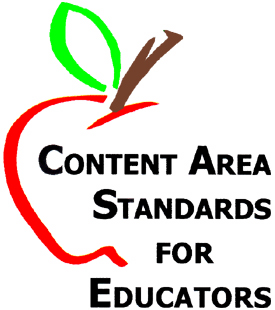 |
Illinois State Teaching Standards Technology Education |

Knowledge Indicators - The competent technology education teacher:
3A. understands that the reading process is the construction of meaning through the interactions of the reader’s background knowledge and experiences, the information in the text, and the purpose of the reading situation.
3B. recognizes the relationships among the four language arts (reading, writing, listening, and speaking), and knows how to provide opportunities to integrate these through instruction.
3C. understands how to design, select, modify, and evaluate materials in terms of the reading needs of the learner.
3D. understands the importance of and encourages the use of literature for adolescents in the curriculum and for independent reading.
3E. understands the relationship between oral and silent reading.
3F. understands the role of subject-area vocabulary in developing reading comprehension.
3G. understands the importance of the unique study strategies required of the specific content area in developing reading comprehension.
3H. understands the importance of the relationship between assessment and instruction in the planning process.
Performance indicators: The competent technology education teacher:
3I. plans and teaches lessons for students that develop comprehension of content-area materials through instructional practices that include analyzing critically, evaluating sources, synthesizing, and summarizing material.
3J. plans and teaches lessons on how to monitor comprehension and correct confusions and misunderstandings that arise during reading.
3K. plans and models use of comprehension strategies before, during, and after reading of text.
3L. provides opportunities for students to develop content-area vocabulary through instructional practices that develop connections and relationships among words, use of context clues, and understanding of connotative and denotative meaning of words.
3M. plans and teaches lessons that encourage students to write about the content read in order to improve understanding.
3N. plans and teaches lessons for students to develop study strategies that include previewing and preparing to read text effectively, recognizing organizational patterns unique to informational text, and using graphic organizers as an aid for recalling information.
3O. plans and teaches units that require students to carry out research or inquiry using multiple texts, including electronic resources.
3P. provides continuous monitoring of student progress through observations, work samples, and various informal reading assessments.
3Q. analyzes and evaluates the quality and appropriateness of instructional materials in terms of readability, content, length, format, illustrations, and other pertinent factors.
3R. promotes the development of an environment that includes classroom libraries.